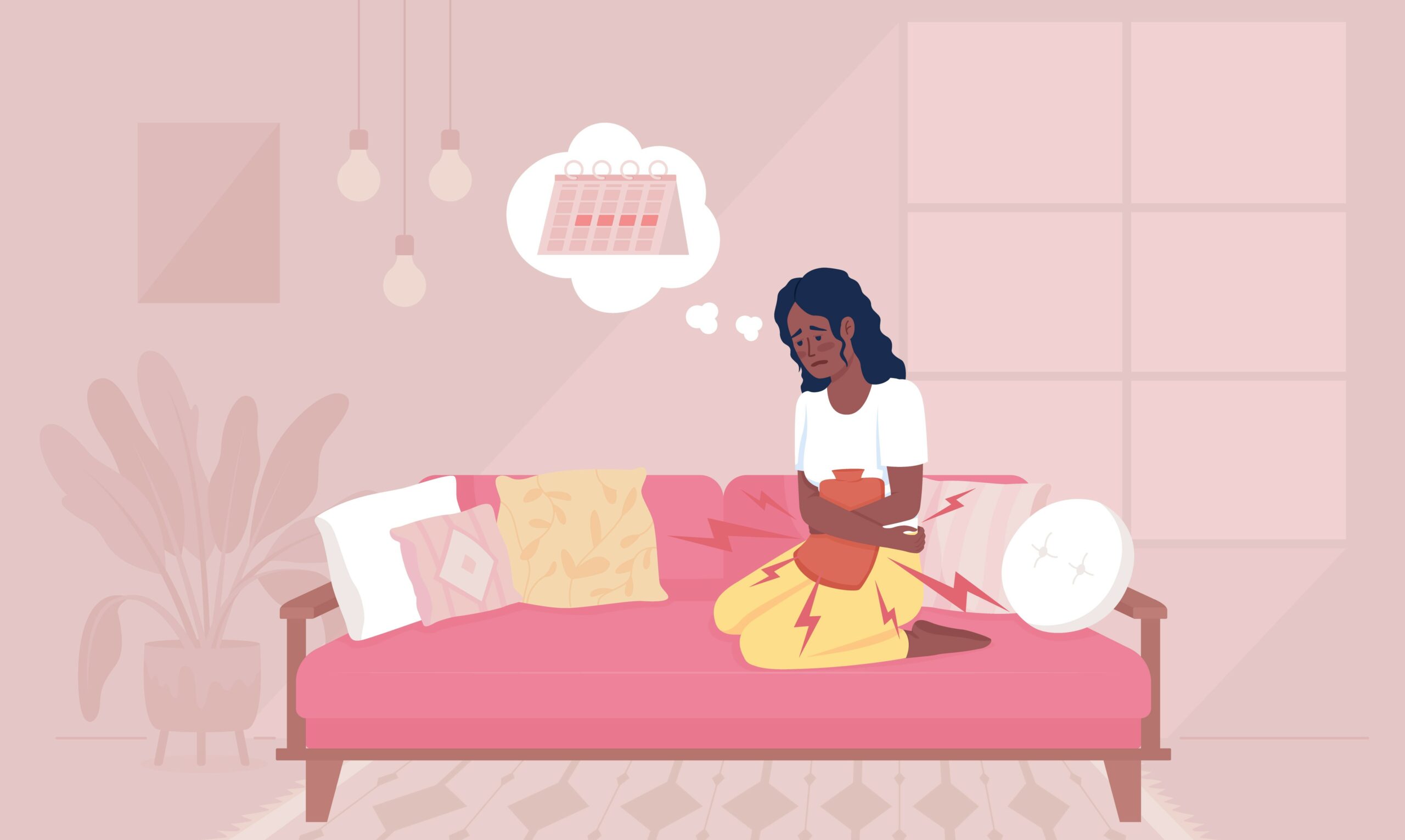The menstrual cycle and mental health
Reviewed by Susan Radzilowski, MSW, LMSW, ACSW

What is the menstrual cycle?
The menstrual cycle is the series of changes a body goes through as it prepares for pregnancy over the course of about a month. There are several phases in the cycle, each of which comes with its own set of hormonal changes.


Can the menstrual cycle affect mental health?
Yes, your menstrual cycle can affect how you feel depending on where you are in your cycle. The average cycle length is around 28 days, but it can be shorter or longer—usually from 21 to 35 days. 1 As hormones fluctuate, they can impact areas of the brain responsible for mood and emotions.
Many people notice their mental health fluctuates in relation to their menstrual cycle. 2 Unfortunately, the relationship between the menstrual cycle and mental health include aspects that remain largely misunderstood, ignored, or understudied. 3
Phases of the menstrual cycle
The three main phases of the menstrual cycle come with their own set of hormonal changes that can influence mood.4
1. The follicular phase is the first half of your cycle, starting on the first day of your period up until ovulation.
2. Ovulation occurs in the middle of the cycle when the ovary releases an egg.
3. The luteal phase starts after ovulation and lasts up to menstruation.
How does the menstrual cycle affect mood?
During menstruation, the hormones estrogen and progesterone are low, which can lead to feelings of sadness or irritability. You may also feel tired or sluggish and experience physical symptoms like bloating or cramping. As your estrogen levels rise toward the middle and end of your period, your mood may improve.
Estrogen levels rise throughout the follicular phase, which may lead to a boost in energy, mood, and libido. As ovulation approaches and surging hormones reach their peak, you might feel at your best both physically and emotionally.
After ovulation, an increase in progesterone can make you feel tired, sluggish, and low on energy. You may also feel more negative overall during this time.5
Progesterone will rise and fall in the luteal phase, and if pregnancy doesn’t occur, estrogen levels also decrease. In the days leading up to when your period starts, hormones drop to their lowest levels. This can contribute to mood swings and mental health concerns.
Keep in mind that not everybody follows the average 28-day cycle and that it’s normal for the length to shift from cycle to cycle. Lifestyle factors, stress levels, and individual health conditions can also influence your menstrual cycle. Depending on these factors, you may experience:
- Shorter, longer, heavier, or lighter periods than you normally do
- Early, delayed, or missed ovulation (anovulation)
- Mood swings, which may range from mild irritability to severe mood disturbances
- Changes in appetite or food cravings
- Variations in energy levels or sleep patterns
- Physical symptoms such as cramps, bloating, headaches, and breast tenderness
- Emotional responses, including feelings of sadness, anxiety, or symptoms of depression
Why do I feel mentally unstable on my period?
Hormonal changes during your period can cause mood swings and feelings of mental instability. These are common symptoms of premenstrual syndrome (PMS) or sometimes premenstrual dysphoric disorder (PMDD). If these feelings are strong and affecting your daily life, it’s best to talk to a doctor or mental health professional.
Premenstrual syndrome (PMS)
PMS involves a variety of unpleasant symptoms that people experience before their periods because of fluctuating hormones. It usually occurs between five days and two weeks before menstruation begins. These symptoms can range from mild to severe and can have a significant impact on your daily life.
Premenstrual dysphoric disorder (PMDD)
PMDD is a more severe form of PMS that’s far less common. Symptoms of PMDD are so severe that they can disrupt daily activities and relationships.
Perimenopause
Your menstrual cycle changes as you age. Perimenopause usually starts in the mid-40s and is the transition phase leading up to menopause. It can last several years, and is characterized by irregular periods and fluctuating hormone levels. Symptoms are similar to PMS, but they may be more pronounced or erratic because of hormonal instability.
Treatment options
Treatment depends on your symptoms and how severe they are. For instance, although PMS and PMDD are related, they could require different approaches. Someone experiencing mild PMS may benefit from lifestyle changes while someone with severe PMDD might require medication or counseling.
Talking with a health care provider can help you find the right treatment plan. Common approaches include:
- Healthy lifestyle changes such as regular exercise, a nutritious diet, and good sleep hygiene
- Stress management techniques like mindfulness, meditation, or yoga
- Over-the-counter pain relievers for physical discomfort
- Hormonal birth control to regulate cycles and alleviate symptoms
- Antidepressants or anti-anxiety medication for severe mood disturbances
- Psychotherapy such as cognitive behavioral therapy (CBT) to manage negative thought patterns and behaviors
- Alternative therapies like acupuncture, massage, and herbal supplements prescribed by a licensed professional.
How your mental health can affect your period
Many people assume that their menstrual cycle is causing mental health problems, but the opposite may also be true. If a mental health issue creates added stress, this can make your PMS or period symptoms worse. Short or irregular periods may also contribute to mental health conditions. For example, people with bipolar disorder who menstruate are twice as likely to experience irregular periods.6
Some medications can affect your menstrual cycle. Antidepressants, for instance, are linked to menstrual problems.7 These problems might include unwanted side effects like heavy bleeding, painful cramps, and missed periods for some people.
If you’re having trouble managing your symptoms, reach out to your doctor or a mental health professional right away. Visit our therapist directory to find licensed professional near you. Filter your results by specialty to get the support you need.

Sources
1 https://www.nature.com/articles/s41746-019-0152-7/
2 https://www.cambridge.org/core/journals/bjpsych-open/article/exploring-the-relationship-between-the-menstrual-cycle-and-womens-mental-health-in-a-female-inpatient-ward/95A08CE1F90BC9A439D17A328C9C2CF9/
3 https://www.frontiersin.org/articles/10.3389/fgwh.2023.1258973/full/
4 https://pubmed.ncbi.nlm.nih.gov/35527220/
5 https://pubmed.ncbi.nlm.nih.gov/19842789/
6 https://pubmed.ncbi.nlm.nih.gov/16566627/
7 https://pubmed.ncbi.nlm.nih.gov/22534402/
About the author
The editorial team at therapist.com works with the world’s leading clinical experts to bring you accessible, insightful information about mental health topics and trends.
Related articles

How hormones affect your mental health
Your hormones are always in flux, which affects your mental and physical...
